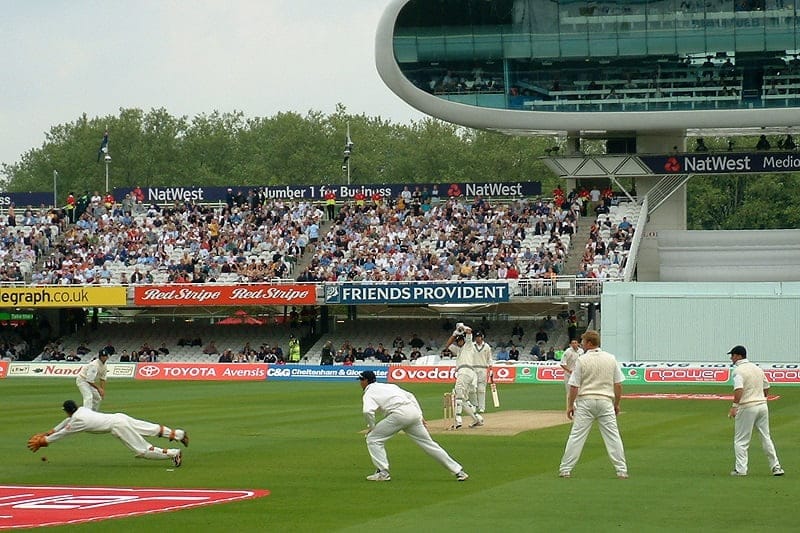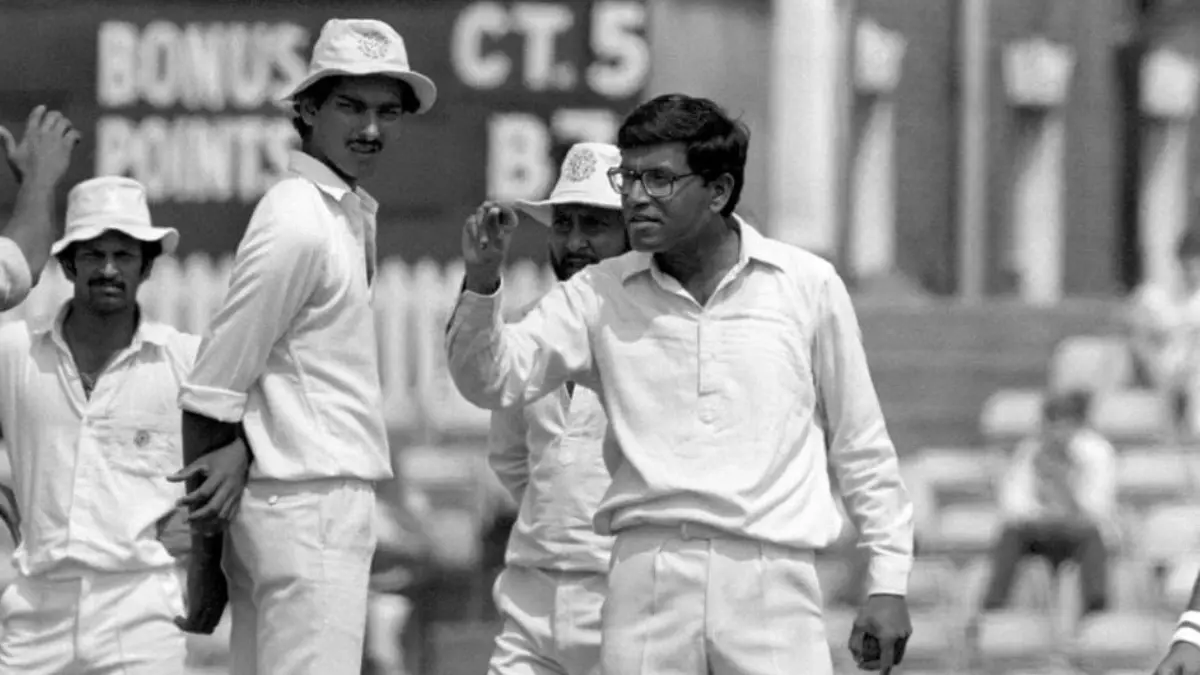England v New Zealand in a Test match at Lord’s, May 2004. Image by Peter Meade licensed under CC BY 2.0
As the rain poured down on the fourth day of the second Test between England and New Zealand at Headingley, it seemed quite possible that the game would be consigned to a watery grave, leaving England 1-0 victors in the ( absurd and typically ICC- sanctioned) two match series. That would have been unfair and a total misrepresentation of the relative merits of the two sides. As it turned out the weather relented on the fifth day and England proved to be woefully inadequate in their effort to bat out the final three sessions. New Zealand’ s margin of victory, 199 runs, seemed fair enough.
The fact that New Zealand’s victory was so conclusive despite the loss of virtually two sessions on the fourth day was a tribute to the aggressive and positive way in which Brendon McCullum and his team play their cricket. Whereas at Lord’s in the first Test, advantage swung teasingly from one side to the other, in this game momentum had more of a tendency to favour one side rather than the other. In particular New Zealand always seemed determined , and able, to recover from a setback , while England, in contrast, seemed incapable of exploiting a position of advantage.
This was illustrated by the two sides’ respective first innings. New Zealand, inserted by Alastair Cook in very difficult conditions when the players always seemed on the verge of coming off for rain, started terribly and were two for two in the third over, both wickets claimed by James Anderson , who became the twelfth man to take four hundred Test wickets. But New Zealand did not retreat into parky negativity, as one can imagine England doing in similar circumstances. Tom Latham and Ross Taylor were always looking for runs, and when McCullum replaced Taylor at 68 for three,in the fifteenth over, he whacked his first ball, from Stuart Broad, over extra cover for six. It is simply impossible to imagine any member of the England side, even Ben Stokes, doing that.
Stand-in wicketkeeper Luke Ronchi, playing his first Test , made a sensational 88 off 70 balls. New Zealand finished on the second morning with 350 , made at just under five an over.
England’s reply was more conventional but, at least to begin with, just as effective. It was crucial for the forthcoming summer’s cricket that Cook and his latest opening partner , local boy Adam Lyth, got off to a good start. They did, weathering the storm directed at them by Trent Boult and Tim Southee. By the time Cook was out for 75, in the 59th over, they had put on 177 for the first wicket. Lyth looked assured and comfortable as he compiled his first Test century in his second game. The fact that they had progressed relatively slowly did not really matter; New Zealand had scored so fast that there was plenty of time left in the match , and a terrific platform had been built for the more adventurous players in the middle order.
Any such plans were laid waste, however, by a superb combined spell of new ball bowling by Boult and Southee. 238 for two when the new ball was taken on the second evening became 253 for five at close of play and then 267 for eight. Broad played better than for some time at the end and England, too, finished on 350, at just over three an over.
As at Lord’s, it was the third innings that made the difference. New Zealand made 454 for eight at a whisker under five an over. It was astonishing stuff. One-day favourite Martin Guptill set the tone with 70 off 72 balls.. As in the first innings the loss of two early wickets was no deterrent to free scoring as he and Taylor put on 99 in just over an hour.
But the innings of the third day, in fact of the match, came from the underrated B-J Watling. Playing as a specialist batsman- the knee he had injured at Lord’s continuing to prevent him from keeping wicket – Watling made 120 with fifteen fours and a six. Playing shots all around the wicket he looked wonderfully organized and assured. Nobody should have been that surprised: when Watling put on an unbeaten 365 with Kane Willamson earlier this year at the Basin Reserve in Wellington to beat the world record for the sith wicket, the record he broke was his own, set with McCullum a year earlier against India at the same ground. As he also narrowly failed to hold what would have been a quite breathtaking catch on the midwicket boundary off Broad, Watling can be said to have had a pretty good match: he was deservedly man of it.
When New Zealand resumed their innings on the fourth morning their score was 338 for 6 with Watling on 100. That morning they scored a further 116 in 16 overs: Broad had a spell of 3-0-42-0. Southee hit forty off 24 balls( again no surprises there: among current players only Chris Gayle, McCullum and Younis Khan have hit more sixes in Tests than Southee ).
So England had the best part of two days to bat. Rain washed out most of the fourth day . They were simply not up to it on the fifth, only the unrelenting Cook , the determined Jos Buttler and , for a while before lunch , Stokes , appearing to have any appetite for the battle. For the first time in the series the spinners played a part, Williamson ( three for 15) and Mark Craig sharing six wickets.
That was the thing for New Zealand: everyone contributed, it really was a team effort. The fielding was brilliant especially in the slips.
For England it was all a bit different. It wasn’t t all bad – far from it. In fact it was in a sense business as usual. The problems revealed at Lord’s were still there , only more so. The Moeen Ali issue was camouflaged at Lord’s by the fact that he made useful runs in both innings. As he is batting at eight he is presumably in the side to take wickets but here he contributed neither runs nor wickets and it is difficult to imagine him causing sleepless nights among the Australian batting order.
More worrying still is the English top order where both Gary Ballance and Ian Bell seem hopelessly out of form. In the Ashes series of 2013, Bell scored centuries in each of England’ three victories. He has a month to get his act together.
Bill Ricquier, 3/6/2015




